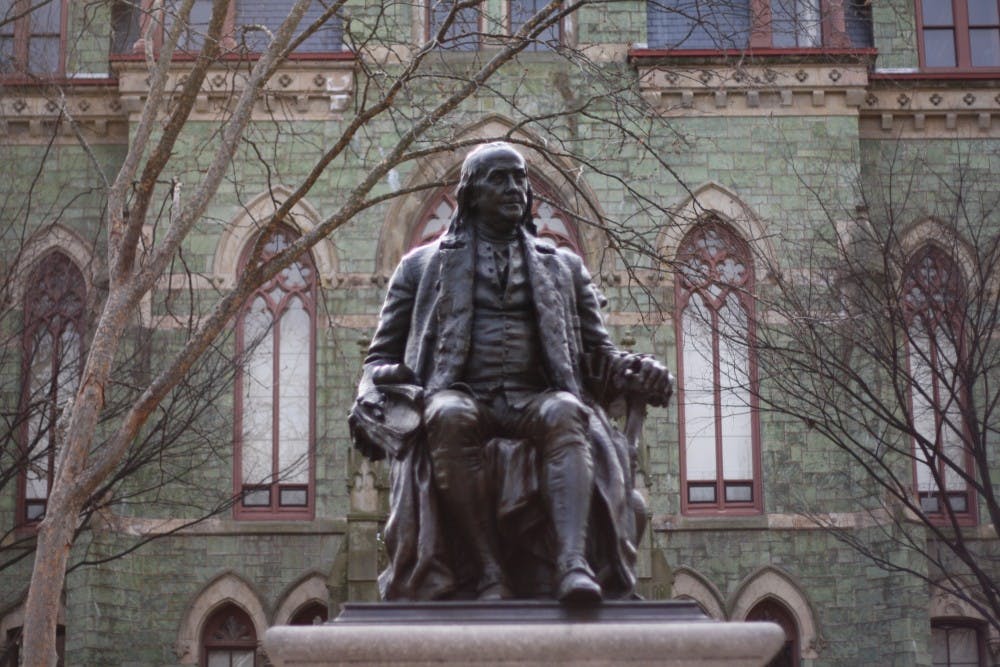I stand in front of the Admissions Office at the back of College Hall, holding up my hand to shield my face from the April sun’s glare. I’ve just wrapped up a crowded tour of Penn’s campus and announced, as always, that I’ll remain outside to answer any lingering questions. A mother clutching her son’s polo–clad shoulders moves closer and lowers her voice.
“My son seems to have had a similar high school experience as you did. Do you think my son will be happy here, too?”
My instincts take over, my smile broadening and making the corners of my eyes crinkle as I nod emphatically and repeat how wonderful my time at Penn has been, and that I’m sure it will be the same, even better, for him. The woman’s shoulders sag in relief. My fake smile turns into a grimace.
I joined Kite and Key my freshman year, and I've loved every minute of it. I conduct weekly tours during the year and last summer, and I even went back to my high school on behalf of Admissions. But there's one question they don't teach you how to answer in all of our training sessions: what if Penn isn't the right school for one of the eager high schoolers you promise it will be?
With Penn graduates for a mother and older sister, Penn was the one school I vowed I would never end up at. I was obsessed with the idea of having a fresh start, of being able to press a sticker emblazoned with the name of a new university onto the backs of my parents' cars. But after finally taking a tour the fall of my senior year of high school, I found myself sending in my Early Decision application to Penn. I told myself that if I got in, the first activity I'd sign up for would be tour guiding.
Two years later, I'm now involved with a host of extracurricular activities aside from Kite and Key. I've formed lasting friendships with amazing people from across the world. My courses have been enjoyable and enlightening. The shy and anxious girl I was in high school has morphed into someone who's outgoing and confident. I truly don't believe I would have come so far without the experiences I've had here, experiences that are unique to Penn.
I'm met with applause and admiring smiles when I deliver this "why Penn" spiel at the end of each tour I give. It's completely honest, it's not an act. But there's something unsettling about pitching this seemingly fairytale-like ending to a group of potential Penn students. I tell them that overall, I’m less stressed now than I was in high school, thanks to my small class sizes and relationships with my professors. But as we pass Van Pelt Library, I don’t mention the frequent all-nighters I spend in its basement cramming for exams. As we stroll down Locust, I insist that Career Services helps all students to secure jobs and summer internships. Yet I choose not to bring up the panic attack I had on that bench on our left after being rejected from an internship program mere weeks before finals. I lead the group through Huntsman’s formidable doors and announce that it’s my favorite place to study. I don’t talk about the focus-enhancement drug exchanges I’ve witnessed in its halls.
My job as a tour guide is to make kids fall in love with Penn the way I did three years ago. I know this university can positively change the lives of more students than it’s able to admit. But I also know that this school, with its undeniably fast–paced, pre–professional, competitive culture, can be a toxic and isolating place for others.
Penn is not a “one size fits all” kind of school. It takes a certain type of self-assuredness, an honest acknowledgment of one’s strengths and limitations, to have a healthy and fulfilling experience here. But this requires violating rule #1 of Penn Face: always appear happy and contented with your life, even if you really feel it’s in shambles. And as we’ve learned, there have been too many students who’ve fallen victim to this paradox.
A few days after I learned of Wharton junior Olivia Kong’s suicide, I received a handwritten thank–you note from a prospective student on one of my tours. The student shared that she planned on applying ED come fall. “It was your tour that cemented my realization that Penn is the place for me,” she wrote in neat cursive. While such notes are always flattering, this one struck a different chord. I couldn’t help but worry. What if Penn isn’t right for this student? What if she struggles here, as so many others have? I felt uneasy as I thought about every potential new student I had come in contact with over the past two years.
Are admissions tours part of the problem? For most high schoolers, deciding which college to attend is the first big life decision they’ll make. My choice to attend Penn has proved rewarding in every way, and I wouldn’t have applied here ED without signing up for a tour that September. But there’s no denying that these tours—at Penn and other universities nationwide—sugarcoat every aspect of college life. Is that fair to the high school student that finds herself so easily swayed?
I’m not sure how to go about answering that question. But in the tours I lead, I’ve started to think more carefully about what pitching Penn should really mean: answering visitors’ questions directly and honestly, even if it varies from what’s inscribed in our tour guiding handbooks. I’m Penn’s biggest advocate, which is why I want to help make it into an even better, healthier place. We have to start chipping away at the “perfect” shiny façade our university wears—and it starts with those who don’t know not to sit on the Ben Franklin statue.

